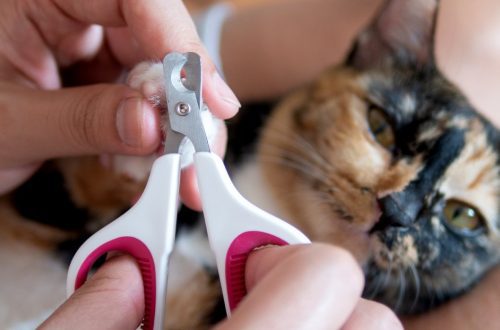
How to make friends with a kitten and make friends with other pets?
 You want your kitten to become a cat that is good with people and is a friend and comrade. To achieve this, you need to remember that cats have a very short period of socialization. Accordingly, the first four to sixteen weeks of her life are the deadline for behavioral and social development.
You want your kitten to become a cat that is good with people and is a friend and comrade. To achieve this, you need to remember that cats have a very short period of socialization. Accordingly, the first four to sixteen weeks of her life are the deadline for behavioral and social development.
Your Kitten’s Early Experience
Before a kitten starts living with you, it will interact with its mother, other kittens in the litter, and possibly some other people.
Be wary of choosing a kitten that hasn’t had much human contact, such as one raised in a barn or paddock close to home. It is probably wild, but it can also be tamed. Kittens at a very early age need to get used to communicating with a person, preferably with several people, so that they learn to perceive not only the one who cares for him. They also need to get used to the places, smells and sounds of everyday life.
Your pet will likely move into your home when they are eight to 12 weeks old. Assuming he’s already interacted quite a lot with people, it shouldn’t be hard for you to build on all the work you’ve done before and help him grow into a friendly, happy, confident cat.
When a kitten first appears in your home, remember that this can be a slight shock for him. Take him to a quiet, safe place and show him where his bowls and litter box are. Soothe him, stroke him gently, talk to him in a soft, calm voice. The main thing is kindness. Play is also a great way to socialize and bond with your baby early in your relationship. We are sure that you will be able to make friends with him.
Children and kittens
Your little kitten should start communicating with children as early as possible, as he may reject or bite them later if he is not used to them from early childhood.
If you have children, they will naturally be very happy with the appearance of the mustache-striped. Your task is to teach them that the kitten is not a toy and must be handled with care. The game time expires when the kitten has played enough. It is also useful to warn children that he may accidentally scratch or bite them.
Your kitten and other people
People are completely different, and the kitten should have the opportunity to get to know them. Get him used to strangers, but make sure they don’t scare him or squeeze him. If the kitten is afraid and hiding, do not insist on communication.
Introduce your kitten at an early age to as many people as possible. In this way, you will most likely be able to avoid his fear of strangers in the future.
Do not forget that kittens get tired quickly. Make sure the meeting time with new people is short enough for the baby to rest.
Introducing the kitten to other pets in the house
Before introducing a kitten to other pets, visit a veterinarian to make sure that all pets are healthy and vaccinated on time.
Smell is the most important sense for cats, so before introducing your kitten to a new home, it’s a good idea to transfer some of your home’s scents to their fur. Mix the scents by stroking the cat already living with you, then, without washing your hands, the kitten – and vice versa.
Introduce your kitten to other pets gradually and one at a time. It’s best to keep your new pet in a carrier or behind an expandable baby barrier – it’s a good way to keep the first encounter in check.
During introductions, isolate pets at any sign of aggression. It may take some time for them to develop a positive attitude towards the newcomer, so never leave a kitten unattended with other pets until you are sure that they get along well. Always keep small pets such as hamsters, fish and birds out of the reach of kittens.
separation anxiety
The good news is that you have raised your kitten well to get along with people. And the bad news is that he is now so attached to you that he will not like it if you leave.
Separation anxiety, previously only found in dogs, has been confirmed to occur in cats. The fear of separation manifests itself in the fact that the kitten will be nervous if you leave the house: it will start to meow too loudly or go past the tray in your absence.
Tips for overcoming separation anxiety include reducing the amount of time you leave your kitten alone. If the baby went past the tray, do not punish him. Cats don’t understand punishment, and since their behavior is already the result of stress, you’ll make the problem worse.
You can easily teach a kitten to endure your short absence. Leave it in the room and leave, closing the door behind you. Come back in a few minutes, but don’t greet him. After you have done this a few times, increase your absence to 30 minutes. But if the cat starts to get restless and meow or scratch at the door, you should shorten the period of absence.





